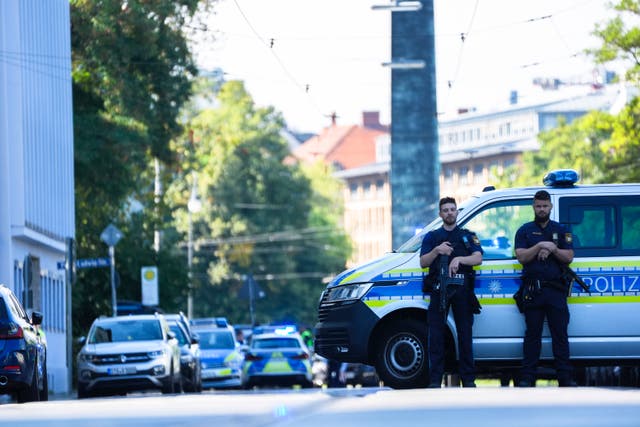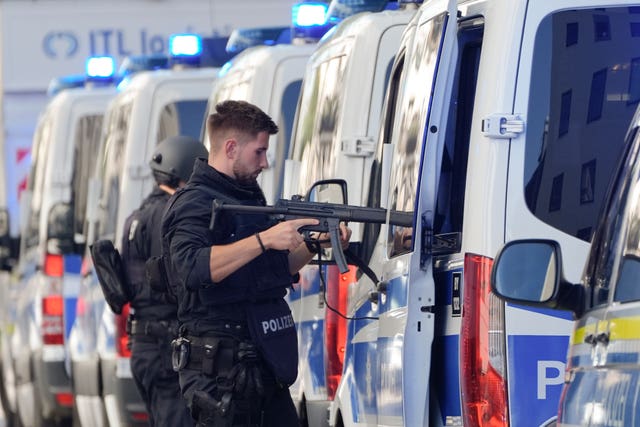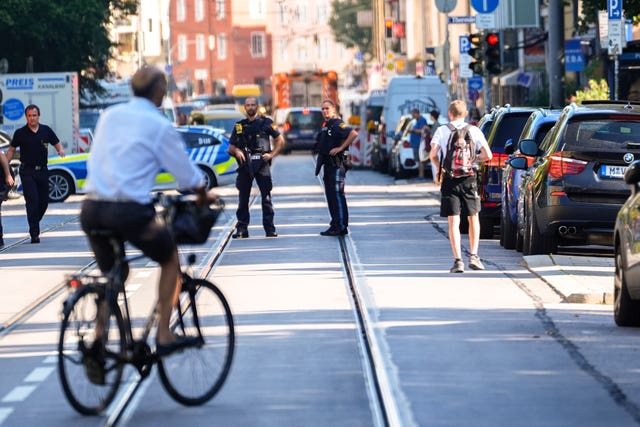Police say suspect killed in police shootout in Munich was Austrian teenager
Authorities believed the teenager may have planned an attack on the Israeli Consulate in the German city.

A man killed in a shootout with police in Munich was an 18-year-old citizen of neighbouring Austria, police have said.
Authorities believed the teenager may have planned an attack on the Israeli Consulate in the German city.
The suspect was fatally wounded near the consulate and a museum on the city’s Nazi-era history after officers were alerted to a man carrying a gun in the Karolinenplatz area at around 9am on Thursday.
The suspect, who was carrying an old long gun with a bayonet attached to it, died at the scene.

There was no indication that anyone else was hurt, spokesman Andreas Franken told reporters.
Five officers were at the scene at the time the gunfire erupted. Police quickly deployed around 500 officers to the area.
Police said the gunman was an 18-year-old from Austria, but investigators were still looking into his motive.
They did not give further details on the suspect, who left a car near the scene.
“We have to assume that an attack on the Israeli Consulate possibly was planned early today,” Bavaria’s top security official, state Interior Minister Joachim Herrmann, told reporters at the scene.
“It’s obvious that, if someone parks here within sight of the Israeli Consulate… then starts shooting, it most probably isn’t a coincidence.”

Thursday was the 52nd anniversary of the attack by Palestinian militants on the Israeli delegation at the 1972 Munich Olympics, which ended with the death of 11 Israeli team members, a West German police officer and five of the assailants.
“There may be a connection — that must be cleared up,” Bavarian governor Markus Soder said.
Police said they had no indication of incidents at any other locations or of any other suspects.
In Austria’s Salzburg province, police said the suspect, an Austrian with Bosnian roots, had come to authorities’ attention in February 2023.
They said that, following a “dangerous threat” against fellow students coupled with bodily harm, he had also been accused of involvement in a terror organisation.
There was a suspicion that he had become religiously radicalised, was active online in that context and was interested in explosives and weapons, a police statement said, but prosecutors closed an investigation in April 2023.
However, authorities did ban him from owning weapons until at least the beginning of 2028. Police said he had not come to their attention since.

Israel’s Foreign Ministry said the consulate in Munich was closed when the shooting occurred and that none of its staff had been hurt.
The nearby Munich Documentation Centre for the History of National Socialism, which opened in 2015 and explores the city’s past as the birthplace of the Nazi movement, also said all of its employees were unharmed.
Israeli President Isaac Herzog said he spoke with German counterpart Frank-Walter Steinmeier.
He wrote on the social media platform X, formerly Twitter, that “together we expressed our shared condemnation and horror” at the shooting.
Speaking at an unrelated news conference in Berlin, German Interior Minister Nancy Faeser described Thursday’s shooting as “a serious incident” but said she didn’t want to speculate on what had happened.
She reiterated that “the protection of Jewish and Israeli facilities has the highest priority”.





